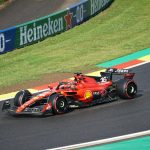With the rapid global expansion of the Ultimate Fighting Championship (UFC), the demand for skilled translators and interpreters has become paramount. These language experts play a crucial role in ensuring effective communication between fighters, coaches, and officials from diverse linguistic backgrounds.
In this article, we present a comprehensive list of current and past UFC translators/interpreters, shedding light on their vital contributions in bridging language barriers and facilitating seamless interactions within the ever-evolving international landscape of the UFC.
Join us as we delve into their responsibilities and the evolution of their indispensable role.
Key Takeaways
- UFC employs a team of professional translators and interpreters to facilitate effective communication between fighters, coaches, and officials.
- The translators/interpreters play a vital role in promoting inclusivity and diversity in the UFC by bridging language and cultural barriers in a global sport.
- Their responsibilities include providing real-time interpretation during interviews and media events, translating official documents and contracts, assisting in negotiations with international fighters, and acting as cultural intermediaries.
- The demand for skilled translators in the UFC continues to grow as the sport expands internationally.
Dariusz Kruczek: UFC Interpreter Since 2014
Dariusz Kruczek has been a dedicated UFC interpreter since 2014, providing linguistic support to Polish fighters and European events. With fluency in English, Portuguese, and Polish, Kruczek plays a crucial role in promoting inclusivity and diversity within the UFC.
As a translator, he helps bridge language and cultural barriers, ensuring effective communication between fighters, coaches, and officials. Kruczek faces numerous challenges in his role, such as accurately translating instructions and rules during fights, as well as assisting in pre-fight interviews and press conferences.
Additionally, he acts as a cultural intermediary, explaining customs and traditions to fighters from different backgrounds. By overcoming these challenges, Kruczek helps create a more inclusive environment within the UFC, fostering understanding and unity among fighters from diverse backgrounds.
Derek Kronig: UFC Translator Since 2008
Having served as a UFC translator since 2008, Derek Kronig has adeptly bridged language barriers and facilitated effective communication between fighters, coaches, and officials.
As a fluent speaker of Portuguese and French, Kronig primarily translates for Brazilian fighters and works as an interpreter during fight week for them.
The role of translators in promoting inclusivity in the UFC is crucial. They ensure that fighters from different linguistic backgrounds have equal access to communication and resources, thus fostering a sense of belonging and representation.
However, UFC translators face challenges in bridging language and cultural barriers. They must accurately convey the nuances of speech and cultural contexts to ensure effective communication.
Additionally, they must navigate the diverse cultural practices and customs within the UFC, which requires a deep understanding of various cultures and languages.
Fabiano Buskei: Joined UFC in 2020
Since joining the UFC in 2020, Fabiano Buskei has been an invaluable addition to the team of professional translators and interpreters. He brings his fluency in English, Spanish, Portuguese, and Italian to assist European and Brazilian fighters during events.
As a translator, Buskei faces various challenges in the global sport of UFC. One of the main challenges is accurately conveying the technical instructions and rules during fights. This is essential to ensure that fighters understand and can act accordingly.
Additionally, Buskei plays a crucial role in promoting inclusivity and diversity within the UFC. By bridging language and cultural barriers, he helps create an environment where fighters from different backgrounds can communicate effectively and feel included.
His work as a translator contributes to the overall success and inclusiveness of the UFC, making it a truly global and diverse sport.
Jorge Gurgel: Former UFC Fighter Turned Translator
After retiring from his professional fighting career, Jorge Gurgel transitioned into the role of a translator for MMA/UFC fighters, bringing his firsthand experience and expertise to assist in effective communication between fighters, coaches, and officials.
As a former UFC fighter turned translator, Gurgel faces unique challenges in his new role. He must navigate the complexities of interpreting technical fighting terms and strategies, while also ensuring accurate translation of instructions and rules during fights.
Furthermore, Gurgel's presence as a translator promotes diversity and inclusivity in the UFC. As a Brazilian fighter, he helps bridge the language and cultural barriers for fighters from his home country, fostering a sense of belonging and representation.
Gurgel's contribution to the UFC not only enhances communication but also promotes a more inclusive and diverse environment for fighters from different backgrounds.
Mizuka Koike: Ufc's Japanese Translator
One of the key translators in the UFC is Mizuka Koike, who serves as the Japanese translator for the organization. As a Japanese translator, Koike faces unique challenges in bridging the language barrier between Japanese fighters and their coaches.
Language barriers can significantly impact fighter-coach communication, leading to misunderstandings and ineffective training strategies. Koike plays a crucial role in ensuring that instructions are accurately conveyed, allowing fighters to fully understand and execute their coaches' game plans.
The ability to accurately translate post-fight interviews from Japanese to English is also vital in providing insights to the global audience. By overcoming these challenges, Koike contributes to the success of Japanese fighters in the UFC and promotes inclusivity and diversity in the sport.
Erivan Conceição: Renowned Interpreter for Brazilian Fighters
Erivan Conceição, a highly regarded interpreter, serves as the go-to language mediator for Brazilian fighters in the UFC. His impact on Brazilian fighters cannot be understated, as he plays a crucial role in ensuring effective communication between fighters, coaches, and officials. However, working as a translator/interpreter in multicultural events like the UFC comes with its own set of challenges.
Some of these challenges include:
- Language barriers: Translators/interpreters must be fluent in multiple languages to accurately convey instructions and rules during fights.
- Cultural differences: Understanding and explaining customs and traditions to fighters from different backgrounds is essential in bridging cultural gaps.
- Real-time interpretation: Translators/interpreters must provide accurate and timely interpretation during fighter interviews and media events.
- Pressure situations: The fast-paced nature of fights and the high-stakes environment can put translators/interpreters under immense pressure to perform.
- Maintaining neutrality: Translators/interpreters must remain impartial and unbiased while translating between fighters and officials.
Despite these challenges, Erivan Conceição continues to excel in his role, showcasing his expertise and professionalism in mediating language barriers for Brazilian fighters in the UFC.
Evolution of UFC Translators/Interpreters
Two major changes have contributed to the evolution of UFC Translators/Interpreters.
Firstly, with the global expansion of the UFC, the need for dedicated translators became apparent. Initially, ad-hoc translators from local communities were relied upon, but as the sport grew in popularity and international fighters joined the roster, the need for skilled translators increased.
Secondly, the importance of language skills in the UFC cannot be overstated. Effective communication between fighters, coaches, and officials is crucial for ensuring accurate translation of instructions and rules during fights, as well as facilitating pre-fight interviews and press conferences. Translators also play a vital role in bridging language and cultural barriers and promoting inclusivity and diversity in the UFC.
As the UFC continues to expand internationally, the demand for skilled translators will continue to grow, presenting new challenges and opportunities for this profession.
What Are the Key Differences Between ONE Championship and UFC?
One championship vs ufc: key differences ONE Championship and UFC differ in several ways. Firstly, their organizational structure differs as UFC is privately owned while ONE Championship is backed by several investors. Secondly, their approach to weight cutting is distinct, with ONE Championship enforcing stricter regulations. Lastly, UFC focuses on entertainment value with more showmanship, while ONE Championship emphasizes integrity and cultural values.
Conclusion
In conclusion, UFC translators/interpreters play a crucial role in bridging language barriers and facilitating effective communication in the world of mixed martial arts.
They ensure accurate translation of instructions, rules, and interviews during fights, as well as assist in negotiations and promotional activities.
These dedicated professionals serve as cultural intermediaries, promoting inclusivity and diversity in the sport while helping fighters understand and comply with UFC policies.
As the UFC continues to expand internationally, the role of translators/interpreters will only become more significant.
- 15 Best Martial Arts Weapons (Fighting & Training) - October 14, 2024
- Is Fencing a Martial Art? (Yes, 4 Reasons Why) - October 14, 2024
- 7 Best Martial Arts for Self-defense Ranked (Highly Effective) - October 14, 2024










